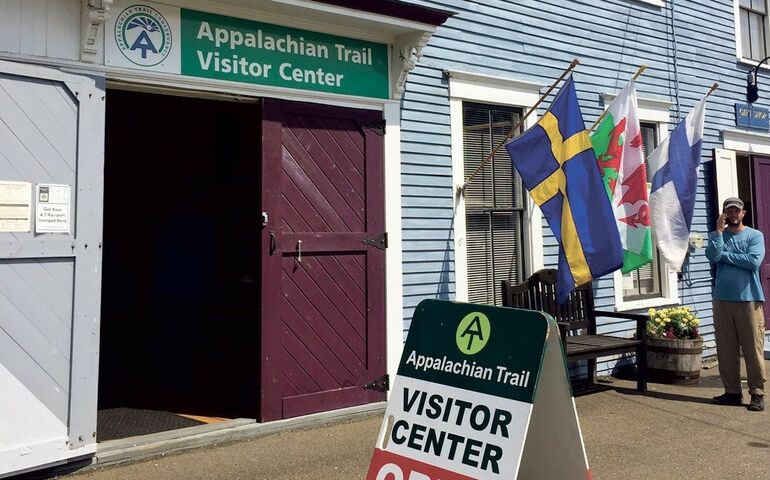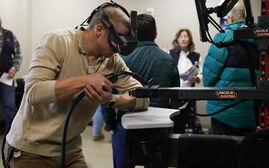Processing Your Payment
Please do not leave this page until complete. This can take a few moments.
- News
-
Editions
View Digital Editions
Biweekly Issues
- December 15, 2025
- December 1, 2025
- Nov. 17, 2025
- November 03, 2025
- October 20, 2025
- October 6, 2025
- + More
Special Editions
- Lists
- Viewpoints
-
Our Events
Event Info
Award Honorees
- Calendar
- Biz Marketplace
Proposed forest rules could hurt Maine economy, cost jobs, delegation says
 Photo / Peter Van Allen
Proposed USDA rules could leave the Appalachian Mountain Club, which owns 75,000 acres in Piscataquis County, ineligible for grants that help provide jobs and boost the economy in one of Maine's poorest counties.
Photo / Peter Van Allen
Proposed USDA rules could leave the Appalachian Mountain Club, which owns 75,000 acres in Piscataquis County, ineligible for grants that help provide jobs and boost the economy in one of Maine's poorest counties.
Proposed U.S Department of Agriculture rules that would limit the size of private forest land qualifying for certain federal programs would devastate the state's forest, recreation and conservation economy, Maine's congressional delegation says.
The USDA in December proposed a 45,000-acre threshold for private nonindustrial forest land eligible for Natural Resources Conservation Service programs, including grants and loans. That threshold would exclude a variety of Maine landowners that contribute to the economy and provide logging jobs, the delegation said in a letter this week to the USDA.
NRCS programs offer financial assistance for things like constructing water management or irrigation, improving resource conditions and implementing conservation practices. Limiting financial and other assistance to owners of 45,000 acres or fewer would not only hurt the state's conservation efforts, but also logging, forest products and recreation industries, costing jobs and hurting local economies, the Feb. 1 letter says. It was signed by U.S. Sens. Susan Collins, R-Maine, and Angus King, I-Maine, as well as U.S. Reps. Chellie Pingree, D-Maine 1st District, and Jared Golden, D-Maine 2nd District.
The current definition has no size limit, but determines "nonindustrial private forest land" is land "with existing tree cover or is suitable for growing trees; and is owned by any nonindustrial private individual, group, association, corporation, Indian tribe, or other private legal entity that has definitive decision-making authority over the land."
NRCS programs have played a "vital role in protecting thousands of acres of pristine working forests that have been managed and utilized for a variety of purposes, including forestry, recreation, habitat restoration and outdoor education," the delegation's letter said. "It is our hope that you will reconsider the proposed definition change to NIPF, as it does not accurately reflect the reality that land holdings greater than 45,000 acres are not exclusively associated with large corporate forest owners."
USDA officials said last year they wanted to change the definition to make it easier to identify land owned by big corporations and other entities that shouldn't be getting the federal money.
"Many of the largest industrial forest owners, including many established timber companies, can be easily identified based on expert knowledge," the guidance note says. "However, many cannot be so readily identified, particularly many holding companies and some [timberland investment management organizations and real estate investment trusts]. Therefore, the most practical way to define large corporate forest owners using consistent methodology is to determine an acreage threshold above which a corporate forest owner will be considered to be a large corporate owner."
Comments closed on the proposed change Jan. 19, and by federal law, guidance would normally have been enacted 30 days after that. But the Biden administration has frozen federal USDA regulations, particularly, a flurry of rules changes in the last weeks of the Trump administration.
The proposal is opposed by the Maine Forest Products Council, Maine Audubon, the National Association of State Foresters, Ducks Unlimited, and dozens of forestry and conservation groups in states across the country.
'A severe blow to Maine's economy'
Maine’s outdoor recreation and logging industries, in particular, play a large role in the state's economy, and the state's forests are sustained in part through NRCS programs, the delegation says.
"It is troubling that your agency has chosen to pursue a threshold of 45,000 acres when determining what qualifies as NIPF,” the letter says. “We remain concerned that entities that have previously used NRCS funds could become ineligible to participate in NRCS programs … The loss of these funds would be a severe blow to Maine’s economy that is already reeling from the effects of the COVID-19 pandemic.”
The letter notes that Maine’s outdoor recreation industry makes up a larger percentage of the state’s economy than in almost any other state, ranking in the top five among Hawaii, Montana, Florida, Vermont and Wyoming, according to new data from the Department of Commerce’s Bureau of Economic Analysis.
The data also show that outdoor recreation in Maine supports more than 40,000 jobs in Maine, accounting for 4.7% of employment. Data compiled by the Professional Logging Contractors of Maine and the University of Maine also estimates that overall annual economic contribution of Maine’s logging and trucking industries, including multiplier effects, is $619 million in output, 9,000 jobs and $342 million in labor income.
On top of the impact to Maine-based conservation efforts and adverse impacts to the recreation economy in the state, the loss of the funding would hurt loggers and logging companies that perform maintenance and conservation work that's paid for with NRCS money.
The Appalachian Mountain Club, which owns and manages 75,000 acres in Piscataquis County, would no longer be eligible under the proposed rule. The AMC has leveraged $523,000 in grants from NRCS, matched by $870,000 in private money, for projects that include hiring loggers and logging equipment to install stream restoration material and restore habitat for brook trout and Atlantic salmon, boosting the local economy in one of Maine's poorest counties.
"The loss of these funds would be a severe blow to Maine’s economy that is already reeling from the effects of the COVID-19 pandemic," the letter says. "These activities also have a secondary impact of improving the ability of loggers to conduct timber stand management and move wood from the forest to market."
The proposed guidance would allow state conservationists and technical committees to set additional state-based criteria, but that doesn't solve the issue of the 45,000-acre threshold.
When the rules change was first announced, then-NRCS acting Chief Kevin Norton said, “We want to ensure we continue program consistency across USDA agencies with how we are defining nonindustrial private forest lands. It’s important that our conservation assistance reach all eligible lands in accordance with proper criteria to ensure we enroll eligible lands that hold meaningful opportunities.”
Mainebiz web partners
Related Content

The Giving Guide
The Giving Guide helps nonprofits have the opportunity to showcase and differentiate their organizations so that businesses better understand how they can contribute to a nonprofit’s mission and work.
Learn More
Work for ME
Work for ME is a workforce development tool to help Maine’s employers target Maine’s emerging workforce. Work for ME highlights each industry, its impact on Maine’s economy, the jobs available to entry-level workers, the training and education needed to get a career started.
Learn More
Groundbreaking Maine
Whether you’re a developer, financer, architect, or industry enthusiast, Groundbreaking Maine is crafted to be your go-to source for valuable insights in Maine’s real estate and construction community.
Learn more-
The Giving Guide
The Giving Guide helps nonprofits have the opportunity to showcase and differentiate their organizations so that businesses better understand how they can contribute to a nonprofit’s mission and work.
-
Work for ME
Work for ME is a workforce development tool to help Maine’s employers target Maine’s emerging workforce. Work for ME highlights each industry, its impact on Maine’s economy, the jobs available to entry-level workers, the training and education needed to get a career started.
-
Groundbreaking Maine
Whether you’re a developer, financer, architect, or industry enthusiast, Groundbreaking Maine is crafted to be your go-to source for valuable insights in Maine’s real estate and construction community.
ABOUT
NEW ENGLAND BUSINESS MEDIA SITES
No articles left
Get access now
In order to use this feature, we need some information from you. You can also login or register for a free account.
By clicking submit you are agreeing to our cookie usage and Privacy Policy
Already have an account? Login
Already have an account? Login
Want to create an account? Register
Get access now
In order to use this feature, we need some information from you. You can also login or register for a free account.
By clicking submit you are agreeing to our cookie usage and Privacy Policy
Already have an account? Login
Already have an account? Login
Want to create an account? Register











0 Comments